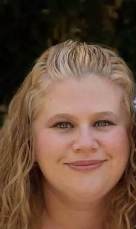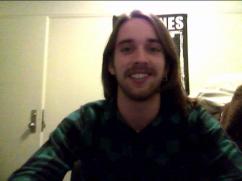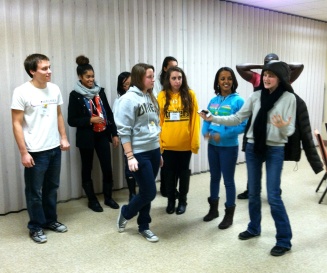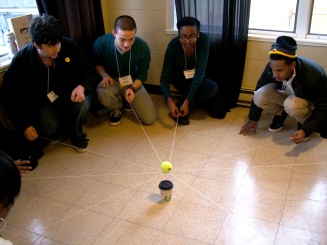Carrie Cleveland ’16, Social Work, and Brian Haran ’15, Mechanical Engineering are students in Civic Agency and Social Entrepreneurship (AMST/POLI/SOCY 205)
Carrie reflects:
 Walking into the first meeting of my Civic Agency class I thought, “I’ve got this.” I am 35 years old. I know what it means to be a good citizen. I know what it means to be involved. I know this all so well because I vote. I follow the campaigns, read my sample ballot, and make informed choices on Election Day. I know what democracy means. I’ve got this.
Walking into the first meeting of my Civic Agency class I thought, “I’ve got this.” I am 35 years old. I know what it means to be a good citizen. I know what it means to be involved. I know this all so well because I vote. I follow the campaigns, read my sample ballot, and make informed choices on Election Day. I know what democracy means. I’ve got this.
This class has opened my eyes. It is showing me that is it my responsibility to be fully engaged in the democratic process. Our instructors are giving us the tools to critically look at problems and make change happen. This is something that I had never really done before. They wants us to make UMBC, and ultimately the world, a better place and they are actually showing us how to do that. Talk about a life lesson.
I have three girls at home that I am doing my best to raise to be good people. One day, one of them may be a student at UMBC. The Civic Agency class gives us a chance to leave a little piece of ourselves behind, to help contribute to the greater good. It shows us that if we want this world to be a better place for ourselves and our children then it is up to us to make it that way, and that there are tools and strategies that can help us get it done.
Brian reflects:
 At the beginning of the semester, I figured that “good” democratic citizens were ones who stayed informed about their government, voted during election season, and rounded their character out by performing some sort of community service. Don’t get me wrong, these are all great characteristics that we should strive for, but POLI 205 has taught me that there is more to being a true part of a democratic community.
At the beginning of the semester, I figured that “good” democratic citizens were ones who stayed informed about their government, voted during election season, and rounded their character out by performing some sort of community service. Don’t get me wrong, these are all great characteristics that we should strive for, but POLI 205 has taught me that there is more to being a true part of a democratic community.
Democracy runs on the idea that everyone’s voice gets to be heard. Living in a republic, we Americans are often of the mindset that our voice doesn’t extend far beyond the voting booth. But I have learned that it can.
Being a citizen in a democracy means that I can take an issue that I see in my day to day life and pursue a solution to the problem. This isn’t an easy thing to do, but nothing worth doing is easy. It requires perseverance, a strong network of supporters, flexibility, ingenuity, and then more perseverance. But the most important step towards success in changing one’s community is realizing that it can be done.
Throughout the semester I have learned that UMBC has many successful programs in place to help students carry out campus change objectives. For example, the UMBC Prove It! competition encourages students to actively pursue the changes they want to see in the campus community, and has yielded significant results. Noche Vida, our campus’s late night coffee shop, is a product of this competition, along with other campus changes.
POLI 205 has helped me see that we have the ability and responsibility, as engaged citizens, to pursue the changes we want to see in our community. What better place is there to start than on our own campus?
Contact the authors: Carrie Cleveland at ccleve2@umbc.edu, and Brian Haran at bharan1@umbc.edu.




